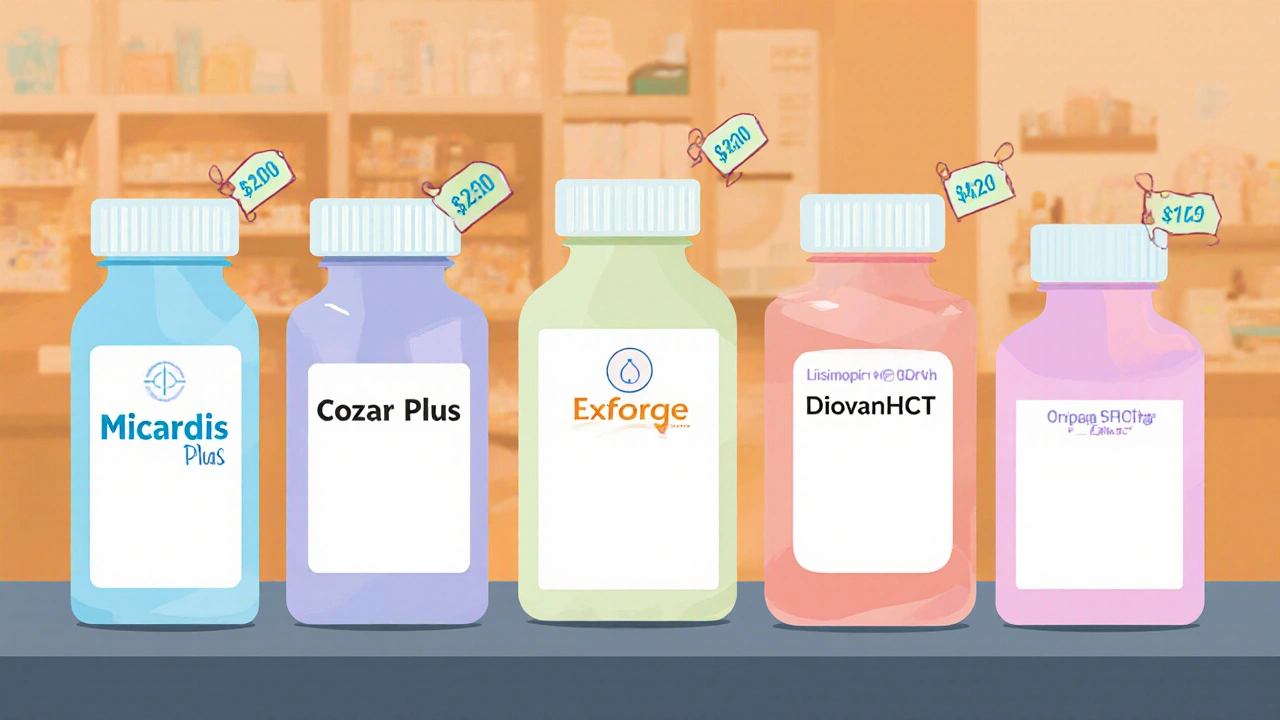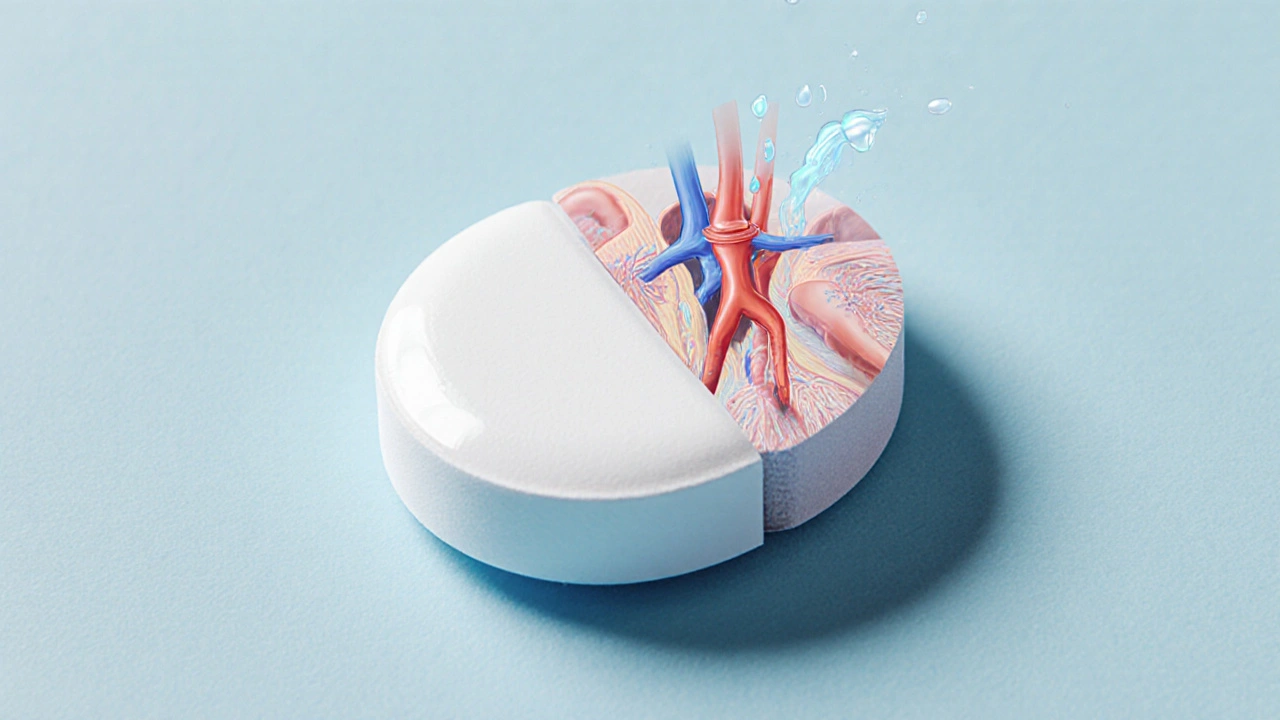Blood Pressure Medication Cost Calculator
Compare Your Medication Costs
See how much you could save by switching from brand-name blood pressure medications to cost-effective generic alternatives.
Select medications to see potential savings.
When treating hypertension, Micardis Plus is a combination tablet that blends telmisartan, an angiotensinII receptor blocker, with hydrochlorothiazide, a thiazide diuretic. The pairing aims to lower blood pressure from two angles: relaxing blood vessels and reducing fluid retention. If you’ve been prescribed this drug, you’re probably wondering how it stacks up against other options on the market. Below you’ll find a straight‑to‑the‑point guide that compares Micardis Plus with the most common alternatives, helping you decide whether to stay, switch, or ask your doctor for another plan.
Quick Takeaways
- Micardis Plus combines telmisartan (ARB) + hydrochlorothiazide (diuretic) for a dual‑action effect.
- Losartan+HCTZ (CozaarPlus) offers similar ARB‑diuretic coverage but at a slightly lower dose of the ARB.
- Exforge (amlodipine+valsartan) adds a calcium‑channel blocker, useful for patients with isolated systolic hypertension.
- Cost varies: generic telmisartan+HCTZ is usually cheaper than brand‑name Micardis Plus.
- Switching should be done under medical supervision to avoid rebound hypertension or electrolyte shifts.
What Is Micardis Plus?
Micardis Plus is marketed as a once‑daily tablet with two active ingredients:
- Telmisartan - an angiotensinII receptor blocker (ARB) that prevents the hormone angiotensinII from narrowing blood vessels.
- Hydrochlorothiazide - a thiazide diuretic that encourages the kidneys to excrete excess salt and water.
The standard dosage in Australia is 80mg telmisartan+12.5mg hydrochlorothiazide, though higher strengths (40mg+25mg) exist for patients needing more aggressive control.
How It Works: Dual‑Mechanism Blood‑Pressure Control
Telmisartan blocks the AT1 receptor, which means the vasoconstrictive signal from angiotensinII never reaches the smooth‑muscle cells lining your arteries. The result is a steadier, wider vessel diameter and lower peripheral resistance.
Meanwhile, hydrochlorothiazide reduces the plasma volume by promoting sodium loss. Less fluid in the bloodstream translates to lower cardiac output, another key driver of hypertension. By tackling both vessel tone and volume, Micardis Plus can achieve a 10‑15mmHg drop in systolic pressure for many patients.

Key Comparison Criteria
When you line up Micardis Plus against other hypertension combos, look at these five factors:
- Efficacy - how much it lowers systolic/diastolic pressure.
- Side‑effect profile - incidence of cough, electrolyte imbalance, dizziness, etc.
- Dosing convenience - once‑daily vs multiple doses.
- Cost & insurance coverage - generic availability vs branded price.
- Special patient considerations - kidney disease, diabetes, elderly, or race‑specific response.
Top Alternatives on the Australian Market
Below are the most frequently prescribed ARB‑diuretic combos and a few mixed‑class options that doctors consider when Micardis Plus isn’t a perfect fit.
- CozaarPlus (Losartan+Hydrochlorothiazide) - Losartan is another ARB; the combo is often cheaper as a generic.
- Exforge (Amlodipine+Valsartan) - adds a calcium‑channel blocker, helping patients with high pulse pressure.
- DiovanHCT (Valsartan+Hydrochlorothiazide) - similar to Micardis Plus but uses valsartan instead of telmisartan.
- Benicar (Olmesartan) monotherapy - for patients who don’t need a diuretic.
- Lisinopril (ACE inhibitor) + HCTZ - alternative pathway targeting the renin‑angiotensin system.
Side‑Effect Snapshot
All these meds share some common adverse events, but the frequency varies. Here’s a quick glance:
- Telmisartan - dry cough (rare), hyperkalemia (low risk).
- Losartan - similar cough profile, slightly higher potassium increase.
- Valsartan - comparable to telmisartan, occasional dizziness.
- Hydrochlorothiazide - electrolyte loss (potassium, magnesium), photosensitivity, increased uric acid.
- Amlodipine (in Exforge) - ankle swelling, flushing, gum hyperplasia.
Cost Comparison (2025 Australian Pricing)
| Medication | Brand / Generic | Average Cost | PBS Coverage? |
|---|---|---|---|
| Micardis Plus | Brand | ≈$45 | Yes (partial) |
| Losartan+HCTZ (CozaarPlus) | Generic | ≈$20 | Yes (full) |
| Exforge (Amlodipine+Valsartan) | Brand | ≈$55 | Partial |
| DiovanHCT (Valsartan+HCTZ) | Generic | ≈$22 | Yes (full) |
| Lisinopril+HCTZ | Generic | ≈$18 | Yes (full) |

Who Might Prefer Micardis Plus?
If you already tolerate thiazides well, need a strong ARB effect, and value a single‑tablet regimen, Micardis Plus is a solid pick. It’s especially handy for patients who have demonstrated good blood‑pressure response to telmisartan alone and want the added diuretic boost without extra pills.
When an Alternative Might Be Better
Consider switching if you experience any of the following:
- Frequent urination or electrolyte imbalance from hydrochlorothiazide.
- Persistent dry cough that you suspect is ARB‑related (switching to an ACE‑inhibitor isn’t advised without a washout period).
- Cost concerns - generic losartan+HCTZ can shave off $20‑$25 per month.
- Specific cardiovascular profile - patients with high pulse pressure often benefit from adding a calcium‑channel blocker (Exforge).
- Kidney disease - some clinicians favor valsartan‑based combos for their proven renal protection.
How to Switch Safely
Never stop Micardis Plus cold turkey. A typical taper plan looks like this:
- Consult your GP or cardiologist to confirm the new prescription.
- Start the replacement (e.g., losartan+HCTZ) at the same time you take the last dose of Micardis Plus.
- Monitor blood pressure daily for the first two weeks; adjust dose if systolic stays above 140mmHg.
- Schedule a lab check after 4‑6 weeks to review electrolytes (potassium, sodium) and renal function.
Following a structured switch reduces the risk of rebound hypertension, which can temporarily raise stroke risk.
Frequently Asked Questions
Can I take Micardis Plus with other blood‑pressure drugs?
Yes, but only under a doctor’s supervision. Adding a third agent (e.g., a calcium‑channel blocker) is common for resistant hypertension, but it raises the chance of low blood pressure and electrolyte issues.
Is Micardis Plus safe for people with diabetes?
Generally, yes. ARBs like telmisartan protect kidney function, which is valuable for diabetics. The thiazide component can raise blood sugar slightly, so monitoring glucose is advised.
What should I do if I miss a dose?
Take the missed tablet as soon as you remember unless it’s almost time for the next dose. In that case, skip the missed one and continue with your regular schedule - never double‑dose.
Are there any food or drink restrictions?
Avoid excessive salty foods, which can counteract the diuretic effect. Grapefruit juice interacts with some ARBs, but telmisartan is less affected than others.
How does Micardis Plus compare to lifestyle changes?
Medication works best alongside diet, exercise, and weight control. Even the most potent combo won’t fully offset a high‑salt, sedentary lifestyle.
Choosing the right antihypertensive regimen comes down to effectiveness, tolerability, cost, and your personal health picture. By weighing Micardis Plus against the alternatives listed above, you can have a focused conversation with your clinician and land on a plan that fits your goals and budget. Remember, any change should be guided by a qualified health professional to keep your blood pressure steady and your health safe.





14 Comments
Danielle Spence
It’s downright shameful that a brand‑name pill like Micardis Plus can cost more than double a generic combo while delivering essentially the same blood‑pressure control. We should be demanding transparency from pharma companies and pushing for policies that put patients before profit. When insurers are forced to foot the bill for such inflated prices, everyone – from taxpayers to vulnerable seniors – feels the pinch. The healthcare system could be a lot fairer if we all insisted on affordable generics whenever they’re clinically equivalent. So, next time your doctor mentions Micardis Plus, ask whether a cheaper alternative would work just as well.
Dhanu Sharma
yeah i get it man the price tag is crazy but sometimes the brand does have that extra feel you want
still you can chill and check if the generic does the job it usually does
Edward Webb
While the financial burden is indeed a pressing concern, we must also respect the nuanced pharmacodynamics that different formulations may offer. Telmisartan’s longer half‑life, for instance, can translate into steadier blood‑pressure control for certain phenotypes, which some clinicians deem worth the added expense. Yet, the principle of beneficence obliges us to consider cost‑effectiveness, especially in public health contexts where resources are finite. A balanced dialogue with one’s physician, weighing both efficacy and affordability, remains the most ethical path forward.
Snehal Suhane
Oh wow, look at you, dropping “yeah i get it” like it’s some profound insight. The brand‑name versus generic debate has been solved since the dawn of time – just pick the cheap one and stop whining. If you’re still stuck on “extra feel”, maybe you need a new hobby.
Ernie Rogers
Honestly the whole thing feels like foreign meds trying to pull a fast one on us while we’re busy defending the American way of life. We could just stick to home‑grown options that keep our wallets safe.
Eunice Suess
Listen up – the article says “cost‑effective generic alternatives” but then lists the price in AUD without mentionin exchange rates. Also telmisatrn is spelled wrong in the table. Grammar matters when you’re trying to convince peple to switch. Cut the sloppy copy and give us straight facts.
Anoop Choradia
It is incumbent upon us, as discerning interlocutors, to recognize that the omission of currency conversion rates may be indicative of a broader stratagem designed to obfuscate the true economic impact of pharmaceutical commodification. One must therefore entertain the hypothesis that certain vested interests deliberately withhold salient data to perpetuate a market wherein brand‑name medications retain undue supremacy. Such considerations merit rigorous scrutiny.
bhavani pitta
Whilst I acknowledge the concerns raised herein, it would be remiss to assert that the mere presence of a typographical oversight invalidates the substantive clinical comparisons presented. The efficacy of the telmisartan‑hydrochlorothiazide combination remains demonstrably robust, irrespective of peripheral editorial lapses.
Brenda Taylor
We really need to stop glorifying overpriced meds when affordable generics exist 😊 it's not just about wallets it's about fairness and accessibility for everyone
virginia sancho
If you're leaning towards staying with an American‑made brand, just remember to check whether your insurance formulary offers a preferred generic alternative. Often the pharmacy will automatically substitute the brand with a bio‑equivalent generic unless you specifically request otherwise. This simple step can shave off a hefty monthly cost without compromising blood‑pressure control.
Namit Kumar
Honestly, supporting local pharma is the way to go 🇺🇸 it keeps jobs at home and ensures our healthcare stays sovereign while still getting good meds
Sam Rail
Sounds good, I’ll ask my doc about a cheaper option.
Gary Tynes
Nice move! Just bring up the generic names next time you’re in the office and you’ll likely get a prescription that saves you a bunch of cash – win‑win.
Marsha Saminathan
Alright folks, let’s dive deep into the wild world of blood‑pressure pills and see which contender really earns its crown. First off, Micardis Plus struts onto the stage with a hefty price tag that screams “premium” but often just mirrors the performance of a modest generic. The telmisartan component works like a gentle shepherd guiding your arteries away from the clutches of constriction, while the hydrochlorothiazide pulls the rug out from excess fluid – a classic tag‑team. Now picture CozaarPlus stepping in with the same choreography but wearing a budget‑friendly suit that doesn’t make your wallet weep. Exforge, on the other hand, brings a calcium‑channel blocker to the mix, adding a splash of flair for those battling isolated systolic hypertension. When you line up the costs side by side you’ll notice Micardis Plus hovering near the $45 per month mark while the generics languish in the $18‑$22 range. That price gap can translate into thousands of dollars saved over a few years, a fact that cannot be ignored by any savvy patient. Moreover, the side‑effect profile of these meds is remarkably similar – a handful of coughs, occasional dizziness, and the usual electrolyte shifts. So the real question isn’t which pill works better – they’re all pretty competent – but which one respects your bank account. Doctors often have a favorite brand because of habit or pharmaceutical reps, yet the evidence shows you can safely swap without losing control of your numbers. If you happen to tolerate thiazides well, the generic combo will likely keep you just as steady. Conversely, if you’ve faced coughs on ARBs, you might explore an ACE inhibitor alone, but that’s a separate conversation. Bottom line: demand transparency, ask for the generic name, and don’t let a flashy label dictate your health destiny. Your heart, your kidneys, and your future self will thank you for the smart choice. Keep the conversation going with your clinician and let the data speak louder than the branding.